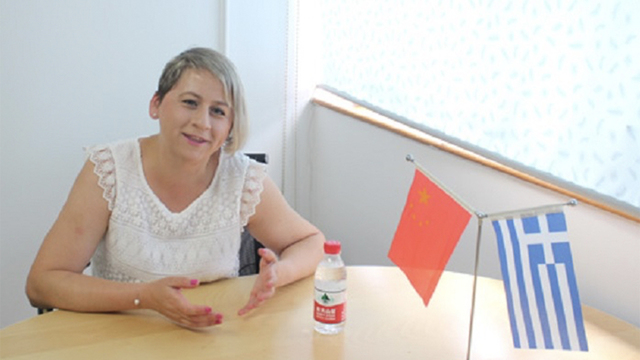
“It’s all Greek to me” is an idiom that people use to express something that is difficult to understand. But Greek people use “It strikes me as Chinese” to describe this concept.
Greek and Chinese are known as two of the hardest languages in the world to learn. Rania Katavouta, a 39-year-old Greek woman, is devoted to teaching Greek in Shanghai and traveling in the world of literature.
Katavouta has worked as a Greek teacher at the Shanghai International Studies University (SISU) for six years. She was the first Greek to be awarded the Shanghai Magnolia Silver Award in 2017 for contributing in city’s development through teaching and enforcing Sino-Greece cultural ties.
As a PhD candidate in Modern Greek Literature in Aristotle University of Thessaloniki, the second largest city in Greece, Katavouta saw a recruitment poster and wanted to have a try. Then she traveled to Shanghai in 2014 and planted her roots there.
“Shanghai is my second home besides my hometown,” Katavouta says.
Katavouta enjoys class and uses multiple ways to lead students into the Greek world.
Guo Shuyao, a senior student in the Greek major, says “In our first Greek class, Mrs. Katavouta stressed ‘Don’t make me speak English’, and talked with us in Greek all the way.”
“It’s hard for freshmen but helpful to create a context for Greek,” says Hu Jingjing, the director of the Greek department in SISU.
Katavouta once had a lesson in the nearby supermarket in the Walmart. She pointed out the Greek names of objects of daily life to students, such as food, vegetables, tools, etc.
During the outbreak of coronavirus, she stayed in Shanghai and had classes online. But if there were choices, she would prefer to have offline class, she says. “The contact between students and teachers is important, so teachers must be in the classroom,” she says.
A project of teaching non-common languages in primary schools and middle schools started in 2015, which was held by the Shanghai Municipal Education Commission. According to the project, students and teachers of the SISU Greek department should give class every week in Jianping Primary School located in Pudong district.
Katavouta has taught in Jianping Primary School several times. She says it is interesting and different from teaching in the campus.
“Kids there are so cute, they speak loudly and bow to me to show respect,” says Katavouta.
Xu Cheng, a 15-year-old student who attended the first round of the Greek teaching project five years ago in Jianping Primary School, says teachers showed them Greek mythology and customs — for example showing your palms to others is impolite in Greece.
The Greek lessons impacted Xu. After transferring to another school, she learnt some German and French, “but I prefer to study Greek!” says Xu.
“The course could open a window for the kids to see the world and let them know there is a country called Greece on this planet,” as Katavouta stresses the aim of the project.
According to Hu, Katavouta actively participates in activities held by the Foreign Affairs Office of the Shanghai and SISU faculty.
“I am proud to be a member of the SISU faculty,” Katavouta says, adding that the interaction with other teachers and students in the campus makes her life colorful and valuable.
In 2016, SISU held a multilingual recital of Lu Xun’s works, who was a leading figure of modern Chinese literature. Katavouta read one chapter from “Kong Yiji” in Greek, one of the most representative pieces of short fiction written by Lu Xun.
Katavouta says that she translated “Kong Yiji” on her own from its English version to Greek because at that time she didn’t know Chinese well.
She passed the fourth level of Chinese Proficiency Test (HSK) in 2019, which equaled B2 level in the Common European Framework of Reference for Language (CEFR).
“I got full mark in the reading part!” Katavouta says, “In the future I would try to translate other Chinese literature from their original versions.”
Thinking and writing poems
Hu Jingjing says that Katavouta is a thinker.
Katavouta has her Chinese name as “Kong Tianrui”. The surname “Kong” has the same initial “K” with her Greek family name. The given name, “Tian” means sky, which is the meaning of her Greek name, while the other character “Rui” means tininess and keeps balance with the huge sky.
Katavouta has written poems in Greek since 2013. After being awarded Shanghai Magnolia Silver Award in 2017, she started to collect her works. Then she published a book of poems last year in Greece, which called “Ballerina into the night”.
She held a presentation for this book in the Greek Consulate General in Shanghai on November 27th, 2020.
Most of the 31 poems talk about her feelings in China and in Greece. Katavouta says that one of the most impressive poems is “Beijing time 6 am”.
Katavouta says the inspiration came from the campus’ early shuttle and the voice of telling time in the radio.
“At Beijing time 6 am, people in China get up and go to work while at the same time people in Greece go to bed,” says Katavouta, “the time difference seems to make time and space parallel.”
“Poetry is the brainchild of thinking and exists in text form,” she says, “maybe we can’t understand some words at first, but they could touch our hearts at last.”
Now Katavouta has six lessons in SISU every week, while she is busy finishing her PhD works. “All my life now is college and PhD,” she says.
She sets three goals for the future: teaching Greek in SISU, staying in Shanghai and finishing PhD. “After PhD, I would like to choose some research topics related to Chinese and Greek literature, especially the poetry,” says Katavouta.



